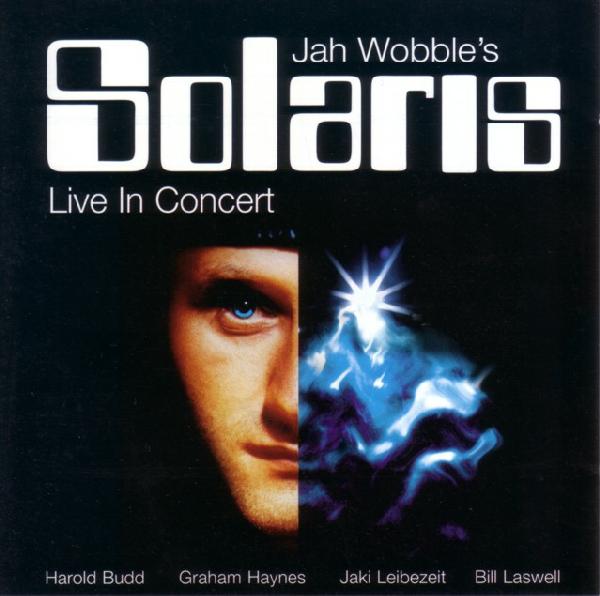SOLARIS


1/ The Mystery of Twilight Part 1 (Solaris) 20.01
2/ The Mystery of Twilight Part 2 (Solaris) 24.37
3/ Seven Dials (Solaris) 6.17
4/ Around the Lake (Solaris) 18.53
Enginered by Cai Murphy
Produced by Solaris
Jah Wobble: bass; Bill Laswell: bass; Harold Budd: keyboards; Graham Haynes: cornet; Jaki
Liebezeit: drums.
2002 - 30 Hertz Records (UK), 30hzcd18 (CD)
From this familiar quintet issues forth quite unexpected music. I'm used to Wobble experimenting with world music-- his output is replete with Japanese shakuhatchis, Cretan flutes, and various earthen drums. The Solaris project, however, opts to explore turbulent inner worlds, the vast distances that Tangerine Dream surveyed with their Zeit album, but with the roiling maniac intensity of Ash Ra Tempel's self-titled debut album.
That these four tracks were recorded live offers the listener an opportunity to hear this quintet in the raw, without the safety net of a producer demanding a retake. As such, each member has seized the opportunity to kick their performances up several notches, all playing beyond my perceived limits of their abilities. For example, until now I have never fathomed what's so appealing about Graham Haynes' cornet-playing. In each setting I've heard it, it's struck me as more than just a little derivative of Jon Hassell's FX-textured horn work, merely adding a dull synthetic color to the other instruments. But here, Haynes has toughened up his sound, as though he's absorbed the fury and delicacy which British free-jazz luminary Evan Parker brought to Passage to Hades. Two-thirds of the way through the 20-minute opening track, "The Mystery of Twilight, Pt 1," I can believe that Haynes is channeling Dark Magus-era Miles, playing with a conviction and intensity he has never shown in the studio.
Though Haynes surprises me, the real revelation on Jah Wobble's Solaris: Live in Concert is pianist Harold Budd. Regarded as the connoisseur's George Winston, Budd memorably collaborated with Brian Eno on Ambient 2: The Plateaux of Mirrors and with the Cocteau Twins for The Moon and the Melodies. His heavily echoed and treated piano style never struck me as anything but decoratively and offensively pleasant. Whatever pill Wobble forced down Budd's throat on this night worked its magic brilliantly.
In place of tinkling arpeggios, Budd transforms his piano and keyboards into a mutant army of squalls and blasts determined to annihilate all traces of delicacy. During the opening track, Budd's keyboard attacks actually resemble Eddie Hazel's jaw-dropping solo during Funkadelic's "Maggot Brain"! And his battalions don't take prisoners, either. I've never heard Jaki Liebezeit so abused. Budd directs the majority of his energies to smothering Liebezeit's metronomic beats, and how refreshing it is to hear Liebezeit so oppressed. I've grown pretty tired of hearing the former Can drummer treated so reverently; whatever he had going on in the 70s has long-since departed. Witness his incredibly mundane work on Burnt Friedmann's Playing Secret Rhythms or Club Off Chaos' records if you need evidence.
Liebezeit sounds baffled by the treatment and metronomes, as if ignoring the ceaseless waves of Budd's kamikaze warriors will make them disappear. Only during the final track, "Around the Lake," does Liebezeit find some energy to retaliate. But he knows not to pick on the vastly superior Budd; thus, his stick work stutters around Laswell's stentorian and untroubled bass figure. The listener witnesses a convergence of irresistible force and immovable object until, when ten minutes into the track, Budd's keyboard impersonates Terry Riley's "A Rainbow in Curved Air." Bass and drums lay back to watch Budd's intricate balletic melodies dance like deliriously destructive Shiva.
Laswell stands tough throughout Solaris. His fuzzed-out bass is reminiscent of his work with Painkiller, the avant-jazz/death-metal that also featured Scorn and Napalm Death's Mick Harris, as well as John Zorn. The shortest track here, "Seven Dials," finds Laswell's bass trading jabs with Haynes' cornet (no contest, by the way-- Haynes doesn't last three minutes). However, Budd mocks Laswell's victory with twee tinkling bells that dance around his lumbering bass.
So where's Wobble? His pure-tone bass is almost unnoticeably present. Most prominent on "The Mystery of Twilight, Pt 2," he sounds less like Robbie Shakespeare and more like Mahavishnu Orchestra's Rick Laird. Across the four tracks, Wobble acts as the ground from which the other musicians ferociously emerge. Having given his name prominence in the title, Wobble demurely retreats into inconspicuousness. Not even appropriating the guise of master of puppets, Wobble becomes the catalyst by which the other reactants burn fearsomely bright and scorch the listener with their unbridled audacity.
8.3 out of 10
Paul Cooper (courtesy of the Pitchfork website)
Hot on the heels of the Deep Space double live album "Largely Live In Hartlepool & Manchester", Jah Wobble has already assembled a new unit, toured and recorded another live album. Solaris is Wobble on clean bass, longtime collaborator Bill Laswell on distorted bass, composer Harold Budd on piano and keyboards, Graham Haynes on cornet and electronics and Jaki Leibezeit of Can on drums. It's almost a case of too much talent for one group but, as you'd expect from improvisers of this caliber, each and every member knows their place and they share the limelight admirably. The starting point is Budd's modal scales on piano, then Wobble's relentlessly repetitious (yet infectious) bass patterns, then Leibezeit's metronomic snare-centric beat. Haynes, Laswell and Budd then texture wrap the groove with ambient backdrops and kinda sorta solos. The group gels, ebbs, flows and orgasms in equal doses, their sound more jazzy than Deep Space's worldliness. With three of the four tracks in the 19 to 25 minute range, it's all about getting into the comfort zone of the groove. The two part 'The Mystery of Twilight', 45 minutes total, is most engaging as overdriven riffs burn alongside a heavy duty rhythmic propulsion. Another winner from Wobble and friends.
courtesy of the Brainwashed website